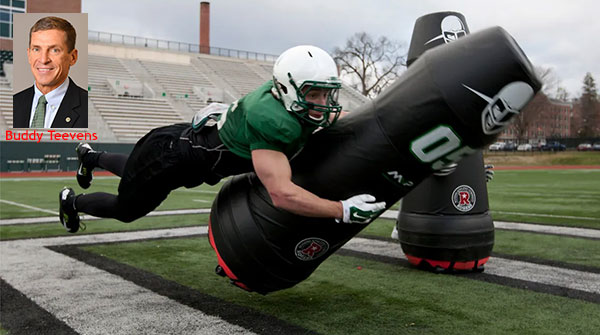Buddy Teeven’s legacy includes advocating for player safety and promoting gender diversity in football coaching
 Buddy Teevens was a progressive football coach in the best sense of the term.
Buddy Teevens was a progressive football coach in the best sense of the term.
Sadly, a tragic accident took him from us way too soon.
Teevens died from complications following a terrible bicycle accident last year. But before he passed, he left some important initiatives for football coaches at every level to follow.
For one, Teevens wanted to take the head out of football.
After seeing the growing body of research on brain injuries, Teevens decided his Dartmouth football team would no longer tackle in practice. He told recruits (and their parents) that he would do all he could to protect their brains.
“[He said,] ‘We understand, look, you come to Dartmouth … Do guys have a chance of playing in the NFL? Sure,’” said Matthew Shearin, who played for Teevens at Dartmouth and is now manager of football administration for the Los Angeles Rams. “‘But for the most part, you’re going to be CEOs and CFOs and VPs, etc., lawyers and doctors. So, at the end of the day, your body, particularly your brain, is the most important part.’”
 Buddy Teevens’ Mobile Virtual Player, a remote-controlled tackling dummy. |
| Related Stories |
| It’s time to make some big decisions regarding football
|
| Dartmouth shows how football can be made safer
|
| Why can’t football make brain health a priority?
|
Dartmouth players practiced tackling with the Mobile Virtual Player (MVP), a remote-controlled tackling dummy Teevens helped develop with students from Dartmouth’s Thayer School of Engineering.
According to Shearin, the MVP was a bit clunky in the beginning. Now, he says it has developed into something “sleek,” something “10 times better than it was with the prototype.” Today, it’s a practice tool being used by numerous teams in addition to Dartmouth.
In February 2017, at Super Bowl LI, the NFL held a competition called 1st and Future, a contest focused on spurring innovation in athlete safety and performance. The MVP won the “materials to protect the athlete” category.
“I used to be the old-school coach: tough, physical, mash guys up,” Teevens said during that presentation. “Now, I’m a little bit more enlightened. There’s a better way to do it.”
In case you’re wondering, Teevens’ teams won at a higher rate after he stopped having teammates tackle each other in practice.
Following the pioneering role Teevens played, the Ivy League, as a whole, voted to eliminate all full-contact tackling from practices during the regular season in an effort to reduce the number of brain injuries and concussions.
Teevens went on to testify before Congress about football safety in a hearing called “Concussions in Youth Sports: Evaluating Prevention and Research.”
In addition to advocating for brain safety measures in football, Teevens was also a strong advocate for helping women find careers in football.
After meeting Callie Brownson at the Manning Passing Academy in June 2018, Teevens asked her to come to Dartmouth as a training camp intern. Teevens was impressed with Brownson’s work at the camp, so he hired her, making Brownson the first known full-time football coach in Division I.
The NFL asked Teevens to be involved in the league’s Women’s Forum, an event held at the NFL combine in Indianapolis every year, to help the league “identify women currently working in college football to join its next generations of leaders.”
“[It] started to snowball a little bit, and other coaches started hiring [women],” says NFL senior director of diversity, equity and inclusion Sam Rapoport. “And not only did Coach Teevens develop and grow these coaches, but he also made calls on their behalf.”
Buddy Teevens left us way too soon. But he positively impacted the game of football from the youth level to the pro level. Because of Teevens, teams at all levels of the game now use his Mobile Virtual Player to protect the brains of their players. And because of Teevens, more and more women are getting the chance to coach football and serve in other positions in the football industry, long considered a male bastion.
“Buddy was always about trying to find the next way of doing things,” says the general manager for the Pittsburgh Steelers, Omar Khan, who interned for Teevens at Tulane. “The one thing (I) really took from Coach T was he really cared about the game of football and the impact that the game of football itself can have on an individual.”
A truly inspiring legacy.
Ken Reed, sports policy director for League of Fans, a sports reform project founded by Ralph Nader. Reed’s work involves advocating for what he sees as positive changes in the sports world, focusing on issues like safety, equity, ethics and fair play. He is the author of The Sports Reformers, Ego vs. Soul in Sports, and How We Can Save Sports.
For interview requests, click here.
The opinions expressed by our columnists and contributors are theirs alone and do not inherently or expressly reflect the views of our publication.
© Troy Media
Troy Media is an editorial content provider to media outlets and its own hosted community news outlets across Canada.
